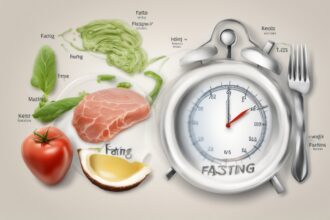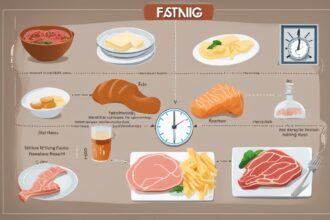Embarking on a ketogenic fasting journey can be transformative for both body and mind, but achieving optimal nutrition during ketogenic fasting is crucial to maximize benefits and avoid potential pitfalls. This dietary approach combines the principles of ketosis—a metabolic state where the body burns fat for fuel—with fasting, a practice of abstaining from food for specific periods. Together, they can enhance fat loss, improve mental clarity, and support overall health. However, without proper nutritional planning, you risk deficiencies, fatigue, or stalled progress. In this comprehensive guide, we’ll explore how to ensure optimal nutrition during ketogenic fasting, offering actionable strategies to thrive on this unique lifestyle.
Understanding Ketogenic Fasting and Its Nutritional Demands
Ketogenic fasting merges the low-carb, high-fat ketogenic diet with intermittent or extended fasting protocols. The goal is to push your body into ketosis, where it produces ketones from fat stores as an alternative energy source to glucose. Fasting accelerates this process by depleting glycogen reserves, forcing the body to rely on fat. However, this metabolic shift places unique demands on your nutritional intake. Optimal nutrition during ketogenic fasting means prioritizing nutrient-dense foods, maintaining electrolyte balance, and timing your meals strategically during eating windows. Without these considerations, you might experience side effects like the “keto flu,” muscle cramps, or energy crashes.
Key Nutrients for Optimal Nutrition During Ketogenic Fasting
To sustain your body during ketogenic fasting, focus on specific nutrients that support ketosis and overall well-being. First, prioritize healthy fats—think avocados, coconut oil, and olive oil—as they provide the bulk of your calories and fuel ketone production. Next, ensure adequate protein intake from sources like eggs, fatty fish, and grass-fed meats to preserve muscle mass, especially during longer fasts. Electrolytes such as sodium, potassium, and magnesium are also critical, as fasting and ketosis can deplete these minerals, leading to fatigue or headaches. Finally, while carbs are limited, incorporate low-carb vegetables like spinach and broccoli for fiber and essential micronutrients. Balancing these elements is the cornerstone of optimal nutrition during ketogenic fasting.
Timing and Structuring Meals for Maximum Benefit
One of the biggest challenges of ketogenic fasting is determining when and how to eat during your feeding windows. For those practicing intermittent fasting (e.g., 16:8 method), meals should be nutrient-packed to meet your needs in a shorter time frame. Start your eating window with a meal rich in fats and moderate protein to break the fast gently and avoid insulin spikes. For example, a breakfast of scrambled eggs cooked in butter with a side of avocado works well. If you’re doing a longer fast (24–48 hours), refeeding should be slow and deliberate—begin with bone broth to replenish electrolytes before moving to solid foods. Structuring meals this way ensures optimal nutrition during ketogenic fasting by preventing digestive stress and maintaining ketosis.
For more insights on meal timing, check out our guide on Intermittent Fasting Schedules for Beginners.
Hydration and Electrolyte Balance: Non-Negotiables
Hydration is often overlooked but is a pillar of optimal nutrition during ketogenic fasting. When in ketosis, your body excretes more water and electrolytes due to reduced insulin levels, which can lead to dehydration if not addressed. Drink plenty of water—aim for at least 2–3 liters daily—and consider adding a pinch of high-quality sea salt to your water for sodium. For potassium and magnesium, supplements or foods like avocados and nuts (during eating windows) can help. Some people also use sugar-free electrolyte drinks, but be cautious of artificial sweeteners that might disrupt ketosis. Staying hydrated not only prevents symptoms like dizziness but also supports fat-burning efficiency.
Learn more about maintaining balance with our post on The Role of Electrolytes in Ketosis.
Common Nutritional Pitfalls and How to Avoid Them
Even with the best intentions, it’s easy to stumble when aiming for optimal nutrition during ketogenic fasting. One common mistake is under-eating calories or protein, which can lead to muscle loss or metabolic slowdown. Track your macros using apps to ensure you’re hitting your targets during eating windows. Another pitfall is neglecting micronutrients—while fats and protein are prioritized, deficiencies in vitamins like B12 or D can creep in if you’re not eating a variety of foods. Lastly, over-reliance on processed “keto-friendly” snacks can stall progress due to hidden carbs or inflammatory ingredients. Stick to whole foods whenever possible. For additional tips, explore our article on Top 5 Keto Diet Mistakes to Avoid.
Supplements to Support Optimal Nutrition During Ketogenic Fasting
While whole foods should be your primary focus, certain supplements can enhance optimal nutrition during ketogenic fasting. Exogenous ketones, for instance, can help maintain ketosis during the early stages of fasting or after a carb-heavy slip-up. MCT oil is another popular choice, providing quick energy through easily digestible fats. For electrolytes, consider a high-quality supplement if food sources fall short. Additionally, a multivitamin or specific nutrients like vitamin D (if you have limited sun exposure) can fill gaps. Always consult a healthcare provider before starting supplements, as individual needs vary. Curious about MCT oil benefits? Read our detailed breakdown in MCT Oil and Ketosis: A Perfect Pair.
Disclaimer: The information provided in this article is for educational purposes only and should not be considered medical advice. Ketogenic fasting may not be suitable for everyone, especially individuals with pre-existing health conditions, pregnant or breastfeeding women, or those on certain medications. Always consult with a qualified healthcare professional or dietitian before starting any new diet or fasting regimen to ensure it aligns with your personal health needs and goals.
References
- Harvard Health Publishing: Ketogenic Diet – Is the Ultimate Low-Carb Diet Good for You?
- NCBI: Effects of Ketogenic Diets on Cardiovascular Risk Factors
- Mayo Clinic: Fasting – What You Need to Know
- Diet Doctor: Electrolytes on a Keto Diet
- Johns Hopkins Medicine: Intermittent Fasting – What Is It and How Does It Work?
This content is for informational purposes only and not a substitute for professional advice.






